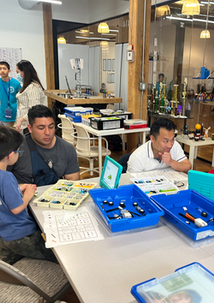The CFI Robotics Journey
At the Center for Future Innovators, robotics is discovery, creativity, and teamwork. Students begin with hands-on LEGO builds, then grow into real engineering challenges with sensors, coding, and design. Our pathway brings learners from first builds to competition-ready skills, supported by experienced instructors and a welcoming community. CFI teams compete at the local, state, national, and world levels. Your child can start at the right step and progress with clear goals, six-week sessions, and projects that build confidence.

Dual Language STEAM Night
This free program resumes in January 2026. The initial schedule will be released in November.
Dual Language STEAM Night is a free bilingual robotics and family learning program starting January 2026 at the Bridgeport Robotics Center. Each session features hands-on LEGO Robotics projects taught in English and a partner language. The first series will include Spanish, Chinese, and Japanese, with plans to add more languages as the program grows. Families learn together, build together, and strengthen communication using shared STEM vocabulary at home and in school.
Quick Facts
-
Who: Children ages 5 to 8 with a parent or guardian
-
Languages: English plus Spanish, Chinese, or Japanese
-
When: Monthly evening workshops beginning January 2026
-
Cost: Free. All materials provided
-
Staffing: Led by bilingual educators with support from trained student volunteers and community partners
-
Location: Bridgeport Robotics Center
What to Expect
-
Bilingual instruction: Robotics concepts in English and a partner language
-
Project-based learning: Design, build, and program LEGO robots together
-
Family focus: Parents and children collaborate side by side
-
Vocabulary building: Practice technical terms in both languages for deeper conversations at home
Supported by the JCCC Foundation’s 2025 Student Development and Achievement Grant.

LEGO Robotics Garage
Launching January 2026 at the Bridgeport Robotics Center.
The LEGO Robotics Garage is a creative engineering workshop for advanced builders. Students design and build ambitious robots using LEGO EV3 kits with full access to motors, sensors, and tools. Work is hands-on and instructor-guided. Students choose projects, prototype ideas, and iterate with coaching to build real engineering skills.
Quick Facts
-
Format: 6 weeks, 1 hour per session
-
Location: Bridgeport Robotics Center
What Students Practice
-
Mechanical design and gearing
-
Sensor use and data-driven behavior
-
Autonomous navigation and testing
-
Iteration, documentation, and teamwork

After-School
Robotics Programs
Serving Chicagoland
CFI partners with schools across Illinois to bring robotics education directly to students after class. Programs focus on hands on learning, teamwork, and creativity through LEGO based engineering. Sessions are typically six weeks, one hour per week, and align with each school’s schedule.






LEGO Robotics Pathway
Our LEGO Robotics Pathway is a structured six-step sequence that takes students from first builds to advanced engineering using age-appropriate LEGO robotics kits. Each course runs for six weeks at one hour per week in person at the Bridgeport Robotics Center and blends hands-on building with guided coding and testing. Instruction is project-based and instructor-led led so students learn core concepts like motion, gearing, sensors, loops, and autonomous control while practicing teamwork and problem-solving. Every class includes work in an engineering notebook where students record pseudocode, design sketches, test results, reflections, and short discussions on real-world engineering applications. Readiness is based on mastery rather than age alone, and completing a course allows students to move to the next level even if they are younger than the suggested range.













